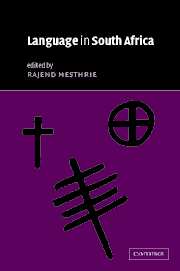Introduction
Published online by Cambridge University Press: 22 September 2009
Summary
This volume is the fifth in a group of books which aims to present a detailed overview of the languages and language-related issues in specific territories. The previous volumes, on the USA, the British Isles, Australia and Canada, have successfully attained these aims, and have served as well-referenced introductions to those areas for students trained in linguistics as well as for general readers. It is hoped that, despite the complexities of South African history and language politics, the present volume will prove as useful a reference. It is my brief in this introduction to make comparisons with previous volumes in the series, and to outline the issues that make language a concern of the wider public in South Africa.
COMPARISONS WITH THE USA, BRITAIN, AUSTRALIA AND CANADA
English has been dominant in South Africa for two centuries and, with its rival Afrikaans, it has changed the linguistic ecology of southern Africa irrevocably. However, the differences between the position of English in South Africa and, say, Australia are quite significant. English is not numerically dominant in South Africa, and functional multilingualism is more common here than in the other territories represented in this series thus far. Many of the indigenous languages have continued to thrive as first languages, with large numbers of mother-tongue speakers and many second-language speakers. Nine of the indigenous languages have attained official status in addition to Afrikaans and English: Ndebele, North Sotho, South Sotho, Swati, Tsonga, Tswana, Venda, Xhosa and Zulu.
- Type
- Chapter
- Information
- Language in South Africa , pp. 1 - 8Publisher: Cambridge University PressPrint publication year: 2002
References
- 1
- Cited by



